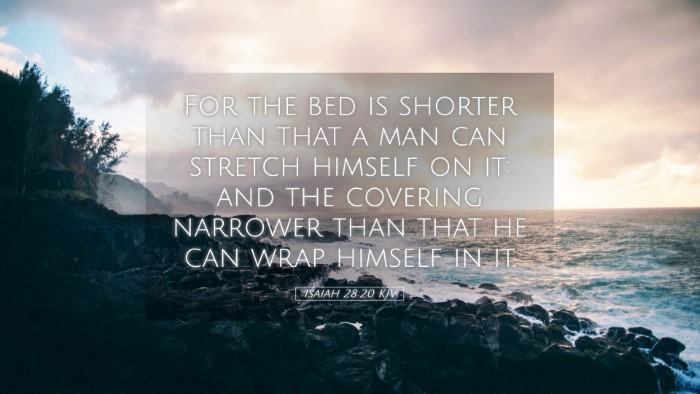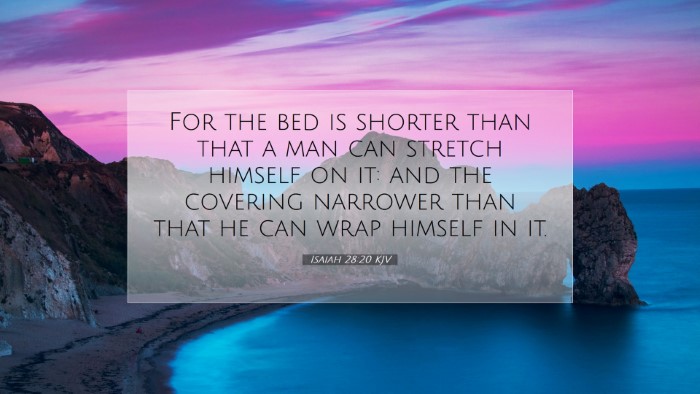Commentary on Isaiah 28:20
Verse: Isaiah 28:20
"For the bed is shorter than that a man can stretch himself on it: and the covering narrower than that he can wrap himself in it."
Introduction
Isaiah 28:20 presents a powerful image that serves to illustrate the futility and inadequacy of human attempts to find rest and security apart from God. Biblical scholars and commentators through the ages have drawn from this verse to expound on themes of judgment, divine wisdom, and the comfort found in reliance on God's provision.
Contextual Background
Isaiah, a prophet in Judah, delivered messages of warning, judgment, and hope during a time of moral decay and political unrest. Chapter 28 primarily addresses the leaders of Ephraim and the southern kingdom of Judah, emphasizing their reliance on faulty foundations—particularly alliances with foreign nations rather than trusting in God.
Key Themes
-
The Inadequacy of Human Solutions:
The metaphor of a short bed and narrow covering is emblematic of the unfulfilled promises of self-reliance. Human attempts at finding rest, peace, and security often fall short, as indicated by Matthew Henry: "When men seek for comfort and shelter in any other but in Christ, they will find it but an ill-contrived bed, a bed too short and covering too narrow."
-
Divine Judgment:
This verse comes as a stark reminder of the judgment pronounced upon those who turn away from the wisdom of God. Albert Barnes notes that the imagery illustrates the precarious state of those who trust in their own understanding rather than God's truth: "They were expecting to find security and comfort, but instead they became the architects of their own discomfort."
-
The Call to True Rest:
The closing of this chapter ushers in a call toward divine rest—one that is fully adequate. Adam Clarke emphasizes the prophetic invitation found in the preceding verses, which contrasts the fleeting nature of human effort with the lasting peace of God: "True rest can only be found in the assurance of God’s grace and mercy."
Detailed Exegesis
Imagery of Rest
The imagery is striking and purposeful. A bed signifies a place of rest and security, but here it is portrayed as inadequate. This serves as a profound reminder that the Lord's ways are intentionally designed to lead us to true rest. The inadequacy is indicative of deeper spiritual truths—those who pursue worldly comforts will always find them lacking.
Application
The implications of Isaiah 28:20 resonate deeply with believers today. Pastors and theologians emphasize the need for congregants to reflect on their sources of comfort and security. Are they seeking peace in transient things, or do they anchor themselves in the eternal word of God?
Pastoral Insight
Pastors are encouraged to guide their congregations toward recognizing the futility in their heavy investments in worldly solutions. Just as a bed that is too short fails to provide comfort, so too do worldly solutions fail to genuinely satisfy. The role of the pastor is to point believers back to the sufficiency of God's provision through Christ Jesus.
Theological Reflection
Theologically, Isaiah 28:20 can provoke discussions around the nature of God’s grace. The discomfort described serves as a divine wake-up call. It can lead to an exploration of how God reveals Himself as the true source of comfort in times of distress. Comfort is ultimately rooted in the character of God who understands human struggles yet provides a way to reconcile these through faith.
Concluding Thoughts
In examining Isaiah 28:20, we reflect not just on the inadequacies of human attempts at finding rest, but on the fullness that is offered through faith in God. Public domain commentaries provide rich insights into understanding this verse through the lens of both judgment and hope. It serves as both a warning and an invitation—an invitation to seek true rest in the midst of a restless world.


